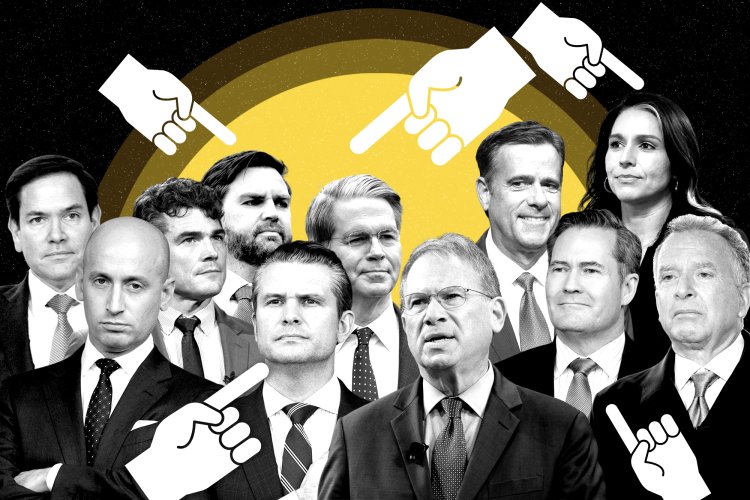This is who the Houthi PC Small Group members are pointing fingers at
None of them have shown any hesitation in addressing the sensitive material on Signal.

Participants from the Trump administration involved in the recently leaked Signal chat are now working to minimize the political fallout. Many are redirecting blame toward the media or Democrats for amplifying the controversy. Others are subtly shifting responsibility to one another, attempting to reframe their roles as minor players, deflecting attention, or simply remaining silent in hopes the scandal will fade.
The chat included nineteen members who discussed sensitive operational details regarding an attack on the Iran-backed Houthi militant group in Yemen, all while a journalist was accidentally included in the group. There are ongoing debates about the extent of the security breach this incident represents, but it’s clear that the situation does not reflect well on those who participated.
President Donald Trump has so far supported the officials involved in the chat, but the scandal could escalate to the point where one or more of them might lose their positions.
Administration officials claim that no classified information was shared within the chat and point to the success of the strike against the Houthis as a defense. However, none of the officials involved have expressed remorse for discussing sensitive information, despite assertions from some former and current officials that the details shared may have been classified at the time. Signal’s security reputation within the U.S. government remains ambiguous, having previously been banned for use on government devices.
A common target for blame has emerged: Jeffrey Goldberg, the top editor at The Atlantic, who was the journalist inadvertently added to the chat. Administration officials accuse him of exaggerating the story and sensationalizing their discussions.
The White House has not responded to requests regarding the varied strategies employed by the administration in light of the controversy.
Here’s a look at how the main figures involved in the chat are responding to the ongoing Signalgate scandal.
HEGSETH Quibbling about ‘war plans’
Defense Secretary Pete Hegseth, who shared some of the most detailed information about the attack, has mainly criticized The Atlantic for misrepresenting the operational details he provided. Following the publication of a story that stated the administration texted Goldberg “war plans,” Hegseth asserted, “nobody was texting war plans, and that's all I have to say about that.”
He reiterated his stance even after more messages were released, which included specifics about the attack timetable and the weapons systems intended for use. An article with the headline “attack plans” elicited a similar response from Hegseth, who remarked, “This only proves one thing: Jeff Goldberg has never seen a war plan or an ‘attack plan.’ We will continue to do our job, while the media does what it does best: peddle hoaxes.”
However, officials familiar with Hegseth's disclosures told PMG that the information was highly sensitive and had the potential to jeopardize the safety of American servicemembers. They also indicated that elements of the strike were likely classified at the time they were shared.
Hegseth has also shared comments supporting other Trump administration officials who criticized Goldberg.
RATCLIFFE Shifting focus to CIA policies and Hegseth
CIA Director John Ratcliffe addressed the chat during scheduled congressional hearings on national security threats. He maintained a defiant stance, asserting the CIA's responsibility for secure device usage and stating that Signal was deemed acceptable for certain operations.
In the leaked chat, Ratcliffe was the first to reveal sensitive information, stating that the agency was “mobilizing assets” to support the operation against the Houthis. When questioned about the classification of shared information, he claimed he did not post any classified material, deflecting to Hegseth regarding whether his message contained classified content. “The secretary of Defense is the original classification authority for determining whether something is classified or not,” Ratcliffe noted.
He also criticized Goldberg, calling his interpretation of the chat “deliberately false and misleading.”
GABBARD Convenient forgetting
Director of National Intelligence Tulsi Gabbard, who was less active in the chat, found herself justifying the conversation alongside Ratcliffe. She minimized her responses, suggesting her inability to recall specifics about the chat. Initially stating she remembered no particular weapons systems or timings, she later attributed her lack of recollection to the information presented in the chat.
Gabbard struggled to maintain a consistent narrative, hesitating to confirm her participation before asserting multiple times that the chat contained no classified information. On several occasions, she redirected senators’ inquiries toward Secretary Hegseth, also referencing an ongoing investigation by the National Security Council.
VANCE Full blame on the journalist, silence on his own posts
Vice President JD Vance has largely concentrated his remarks on condemning Goldberg. He defended Ratcliffe amid accusations regarding breaches of policy while remaining silent about his own comments questioning the merits of the strike against the Houthis.
His spokesperson, William Martin, conveyed that the vice president “unequivocally supports this administration’s foreign policy,” asserting Vance and Trump “had subsequent conversations about this matter and are in complete agreement.”
WALTZ Taking his knocks and fighting for his life
In a departure from others in the administration, Waltz, who created the Signal chat, accepted full responsibility for the incident. “I take full responsibility," he told Fox News, marking him as one of the few officials to acknowledge a mistake.
However, he deflected inquiries regarding how Goldberg’s contact was saved in his phone. “Have you ever had somebody’s contact that shows their name… and then you have somebody else’s number?” he questioned in response. He attributed some security concerns with the Signal application to issues the Trump administration faced with outdated technology and leveled criticism at Goldberg and The Atlantic for sensationalizing the situation.
Waltz also labeled Goldberg “the bottom scum” and aligned with other Trump officials in denouncing The Atlantic’s narrative shift from “war plans” to “attack plans.”
RUBIO Staying above the fray
Secretary of State Marco Rubio has largely steered clear of the infighting, carefully choosing his words in discussions about the chat. He contributed minimally to the chat, only commending the successful strike and noting that the State Department’s chief of staff would be involved in the team coordinating response efforts.
When asked during a recent trip about the need for the administration to address the incident, Rubio characterized it as a misunderstanding regarding the chat’s intent, meant to facilitate communication about the attack. “Obviously, someone made a big mistake and added a journalist,” he stated.
KENT Defending Gabbard and broadening the media critique
Joe Kent, Trump’s nominee to lead the National Counterterrorism Center, has echoed criticism of Goldberg while aligning with Gabbard, sharing her assertion that no classified information was shared in the chat. He offered little input during the chat itself but has broadened his critiques to target other media figures, particularly a CNN reporter discussing the classification of Hegseth’s messages.
WITKOFF Complaining about the Wall Street Journal
Special envoy Steve Witkoff has mostly refrained from commenting on the matter, having only sent emojis celebrating the strike's success in the chat. Still, he responded to a Wall Street Journal editorial claiming he participated in the chat on a personal device while in Russia. Witkoff clarified that he used government devices and did not engage in the conversation until after leaving Russia, referencing CBS reports to support his account. “Maybe it is time for media outlets like the Journal to acknowledge when some of their people make serious reporting mistakes,” he remarked.
MILLER Lashing back at Democrats
Deputy White House Chief of Staff Stephen Miller has generally kept out of the discussion, focusing primarily on issues of immigration. He voiced limited comments in the chat, primarily emphasizing the president’s intent to proceed with the strike. Recently, he shared a critique accusing Democrats of hypocrisy regarding calls for Hegseth’s resignation while overlooking failures in the Biden administration.
BESSENT Playing the age card
Treasury Secretary Scott Bessent entered the discussion only once in the chat, identifying his chief of staff’s involvement in a team. When asked about the chat during a Fox News interview, Bessent downplayed his participation, indicating he would defer to legal experts on the situation. He humorously noted being one of the older cabinet members, saying, “I still like to pick up the phone and call people."
GOLDBERG Blaming the administration writ large
Since the initial article's release, Goldberg has not held back in his criticism of the administration's attempts to downplay the significance of the chat. He openly challenged the White House narrative, arguing, “If Karoline Leavitt is arguing that it's not a war because Congress didn't declare war on Yemen… But this is operational details about a forthcoming attack on an enemy that has anti-aircraft capabilities.”
Goldberg highlighted the dangers of sharing such sensitive information on a messaging app, asking, “So why you would tell anyone in the world on a messaging app that American pilots are about to fly into a — sorry for the expression — warzone?”
Staying radio silent
Several members of the Signal group chat have maintained a low profile following the incident. This group includes Wong, Needham, Katz, NSC senior director Walker Barrett, NSC Chief of Staff Brian McCormick, and White House Chief of Staff Susie Wiles. Many members lack active social media accounts or did not participate significantly in the chat, and they have not faced substantial questioning from the media or lawmakers.
Wiles was the only one who commented in the chat, offering praise for the strike. Wong has faced criticism over conspiracy theories regarding his background, but prominent allies have defended him against these unfounded allegations, and the White House has not commented on the matter.
Anna Muller for TROIB News












